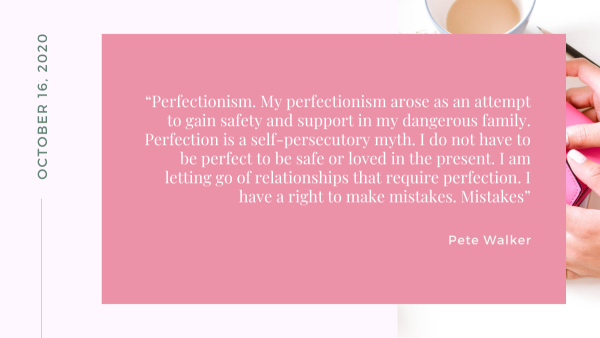
Growing up in Toxic/Dysfunctional families is centred around getting to know what our caregivers/parents expect of us, how to carry out those expectations and the consequences of not getting those expectations figured out perfectly. There's no such thing as good enough, nor is there verbal or emotional communication about those expectations, they are literally unspoken expectations that we learn through being on the receiving end of the consequences of not meeting expectations. T
his type of upbringing literally makes it impossible to know who I am. However, as adults, we get to turn all of this around.
Reading Pete Walkers book Complex PTSD: From Surviving to Thriving I came to understand how important recognising the areas I need nurturing in could be plus how knowing this information helps reclaim the parts of my soul not authenticated throughout my childhood.
Over the years I've come to understand that my brain needs this type of information in order that I can feel safe in the world. Having the knowledge that large chunks of information about myself are missing helps my brains safety mechanism let go and allow me to fully experience my emotions. Also, I use this knowledge to reaffirm who I am.
As you read through the following information grab a notepaper and pen. Write down the nurturing elements that jump off the page and turn them into developing an awareness of where you need to begin applying nurturing daily. For example: When I was recording the video on nurturing, (it's part of the Understanding Grief series), I was reading out the Emotional Nurturing section and I realised why my mum couldn't communicate with me over my weekend chore of cleaning the shower.
It's not necessary to go back to the past nor necessary to go back to the trauma at all. Over time as you reclaim your authentic self very gentle moments of increased understanding come forward, giving you an ah-ha moment. Yes, sometimes, we need to grieve the nurturing aspects we didn't receive as children. And that's more than okay. Tears shed release the emotions our body has been holding onto for years.
his type of upbringing literally makes it impossible to know who I am. However, as adults, we get to turn all of this around.
Reading Pete Walkers book Complex PTSD: From Surviving to Thriving I came to understand how important recognising the areas I need nurturing in could be plus how knowing this information helps reclaim the parts of my soul not authenticated throughout my childhood.
Over the years I've come to understand that my brain needs this type of information in order that I can feel safe in the world. Having the knowledge that large chunks of information about myself are missing helps my brains safety mechanism let go and allow me to fully experience my emotions. Also, I use this knowledge to reaffirm who I am.
As you read through the following information grab a notepaper and pen. Write down the nurturing elements that jump off the page and turn them into developing an awareness of where you need to begin applying nurturing daily. For example: When I was recording the video on nurturing, (it's part of the Understanding Grief series), I was reading out the Emotional Nurturing section and I realised why my mum couldn't communicate with me over my weekend chore of cleaning the shower.
It's not necessary to go back to the past nor necessary to go back to the trauma at all. Over time as you reclaim your authentic self very gentle moments of increased understanding come forward, giving you an ah-ha moment. Yes, sometimes, we need to grieve the nurturing aspects we didn't receive as children. And that's more than okay. Tears shed release the emotions our body has been holding onto for years.
The 4 Areas of Nurturing for Reclaiming Who I Am
Effective. | Trauma. | Recovery. | Found Here.
Learn more about complex trauma recovery coaching with Linda. For those taking a proactive approach to recovery and needing answers to help heal their whole self.

